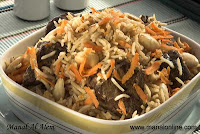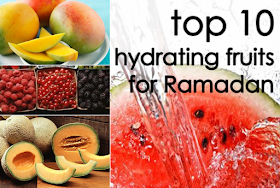By Umme Faatimah (B.Dietetics Univ. of Pretoria)
The modern world has swept us off our feet in so many ways...our
dressing, our lifestyles and most noticeably our eating habits. We have
so casually adapted the western culture of unhealthy eating, moving
further and further away from the Noble teachings of the Quraan and
Sunnah of The Noble Messenger of Allah (Peace be upon him).
Yet, the newest nutritional research continues to discover the
benefits of certain foods, labelled as “Super Foods”. They have also
unravelled the great benefits of certain eating habits, such as washing
the hands before and after meals, eating with the hands, not drinking
with meals…just to mention a few. However, all of this has already been
outlined in the Holy Qur’an and Sunnah more than 1400 years ago.
We are certainly the losers if we do not make an effort to practice
upon the Sunnah in our homes and kitchens. What better time to bring
about these changes than now? Our beautiful Deen offers us the
opportunity during the beautiful month of Ramadhaan, to bring about
positive changes in our lives- changes that benefit us mentally,
physically and spiritually which Insha Allah (Allah Willing) can be
sustained for the future.
Physically, fasting gives the digestive system a much needed rest.
Energy normally used for digestion is now directed to body
detoxification, tissue repair and system healing.
With that in mind I have chosen to highlight just a few of the
favourite foods of our The Noble Messenger of Allah (Peace be upon him).
With the special month of Ramadhaan fast approaching, we can all ensure
we have these foods on our shopping lists. InshaAllah, by us adopting
the lifestyle of The Noble Messenger of Allah (Peace be upon him) we
will be rewarded enormously… Ameen.
DATES
Dates are the most mentioned fruit in the Quraan. They are high in
energy, fibre, iron, vitamins and minerals. The Noble Messenger of Allah
(Peace be upon him)said: “ The home with no dates is like the home with
no food”.(Hadith- Sahih Muslim)
The Noble Messenger of Allah (Peace be upon him)used to break his
fast with fresh dates and a few sips of water. If he did not find fresh
dates, he would use dried dates. He (pbuh) said: “When one of you breaks
the fast let him do so with dates, for they are a blessing and if he
cannot find dates then with water for it is a purification”
(Hadith-Tirmidhi)
He often consumed dates with cucumber, butter, cream or bread. A
dessert called “Haisa” made with ghee (butter), dates, cheese and
yoghurt was also prepared.
Tips: At iftaar (breaking fast) time, dates can also be used to
prepare date milkshakes, date chutney, date desserts as well as
sprinkled over salads. For sehri (pre-dawn meal), dates can be used as a
softened spread over bread or added into muffins, rusks etc.
OLIVE OIL
Dieticians and nutritionist the world over have been advocating the
use of olive oil for its excellent cardio-protective, anti-oxidant and
anti-inflammatory effects. Ongoing research is revealing more and more
great benefits on the consumption and application of olive oil.
The Noble Messenger of Allah (Peace be upon him)said: “Eat the olive
and use it as an ointment as it comes from a blessed
tree”.(Hadith-Tirmidhi)
Tips: During Ramadhaan, olive oil is best used raw as a dip for
breads or as a salad dressing. The lighter olive oils are well suited
for cooking and baking purposes. Whole olives can be added to salads as
well as de-pitted and added to breads, muffins, pies and pizzas.
BARLEY
A recent Readers Digest article highlighted barley as one of the
five healthiest foods we tend not to eat. Yet it was barley that was one
of the staple foods in the diet of our The Noble Messenger of Allah
(Peace be upon him). Modern research is discovering that barley has a
very high soluble- fibre content. This helps to keep the arteries clear
and healthy. It has an extremely low glycaemic index (GI), which means
it takes a longer time to digest, keeping one fuller for longer.
It is mentioned that The Noble Messenger of Allah (Peace be upon him) consumed barley in the following ways:
SAWIQ – a coarse broth prepared from ground wheat and barley - very much like a haleem (soup)
THARID – Barley bread covered in gravy cooked with meat
TALBEENAH – A porridge prepared using barley and milk
A Hadith in Mishkaat narrates that The Noble Messenger of Allah
(Peace be upon him)never used sifted flour in his lifetime. We should
take lesson from this, as we are all moving to consuming more refined
and processed foods where all the beneficial nutrients have been
stripped off. Allah SWT mentions in the Holy Quraan grains with their
husks, amongst His many gifts to us. Un-sifted flour as used by The
Noble Messenger of Allah (Peace be upon him)contains all the valuable
nutrients found in the bran and germ layers and has a lower GI.
Tips: During Ramadhaan, barley can be added to soups and broths or
prepared as a drink by boiling and straining mixture. A hadith in
Bukhari mentions that The Noble Messenger of Allah (Peace be upon him)
consumed “Sawiq” at iftaar. Barley flour can be used for preparing
breads and rotis. Substitute 1.5 cups barley flour for every 3 cups
regular flour. Cereals containing barley flakes like muesli can be
purchased, or barley flakes can be added to biscuits, muffins, breads
and other cereals.
Barley can be prepared as a filling porridge for sehri -Talbeenah.
Soak 1-2 tablespoons whole barley overnight in a flask filled with
rapidly boiling water. At sehri time, strain water out and prepare
porridge with honey and milk. (Store bought “pearled barley” has been
polished with some of the bran layer removed).
HONEY
Modern research has been abuzz with the myriad of health benefits
associated with honey- anti-inflammatory, immune boosting, energising
tonic….to name a few. Our beautiful Deen has encouraged the use of honey
1400 years ago. The Holy Quraan mentions“there comes forth from the
bee’s belly, a drink of varying colours, wherin is a healing for
men”.(Qur’an 16:68-69)
The Noble Messenger of Allah (Peace be upon him) further said “ Make use of two cures- honey and the Quraan”(Hadith-Ibn Majah)
The Noble Messenger of Allah (Peace be upon him) loved drinks that were sweet and cold and often consumed honey water.
Tips: Honey can be used to sweeten items like tea, fresh juices,
milk drinks and cereals etc. Raw honey which is thicker and creamier
has a lower GI, and can be mixed with cinnamon and used as a spread on
toast for sehri.
GRAPES AND RAISINS
Grapes have been found to contain resveratrol- a powerful
antioxidant that protects the body on a cellular level from damage. The
seeds are rich in flavonoids which lower the risk of fatty plaque
accumulation on the lining of blood vessels to the heart.
The Noble Messenger of Allah (Peace be upon him) loved eating
grapes. Hadith in Abu Dawood mentions The Noble Messenger of Allah
(Peace be upon him )often consumed a drink “Nabeez”- prepared from
soaked raisins. Nabeez can be prepared by soaking raisins after Esha
(evening) prayer in clean water covered with a plate. The following
morning the water can be drunk and the soaked fruit eaten or just use
the blender to obtain a beautiful cloudy Nabeez. And, if you soak in the
morning, drink in the evening. Nabeez should be consumed within twelve
hours of soaking to prevent fermentation.
Tips: Nabeez or fresh grape juice can be prepared as a drink after
Taraweeh (evening prayer in Ramadaan). Grapes can be served as part of
salad or dessert. Raisins eaten with nuts can be enjoyed as a healthy
munch after taraweeh salaat.
The Sunnah way of eating is the healthy way of eating. InshaAllah,
let us all strive to revive and bring alive the Sunnahs of The Noble
Messenger of Allah (Peace be upon him) in our homes this Ramadhaan. I
have highlighted just a few. Make an intention to eat on the floor,
share eating utensils and to fill a third of your stomach with water, a
third with food and a third left for air.
Besides the immense health benefits outlined above our greatest
rewards really lie in following the Sunnah, as it comes in Hadith
mentioned by The Noble Messenger of Allah (Peace be upon him):
“ The person who follows my Sunnah is the one who truly loves me, and will be with me in Jannah” (Hadith-Tirmidhi)
Allah Ta’ala said to His Messenger (pbuh)“Say (to mankind), if you
love Allah, follow me – Allah will love you and forgive your sins.”
(Qur’an:3: 31)
Wishing you all healthy eating, the Sunnah way…Ramadaan Mubarak!
















